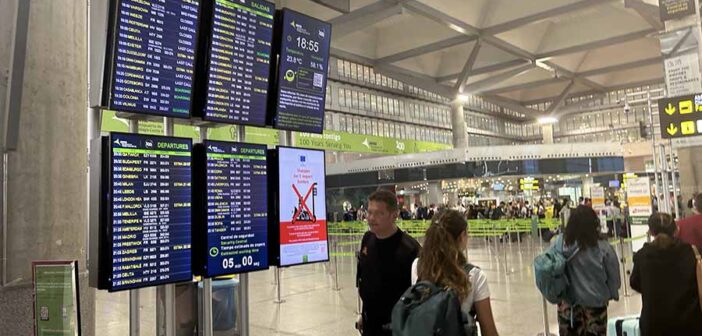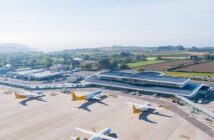Málaga-Costa del Sol Airport, located 8 kilometres southwest of Málaga’s city centre in the Churriana district, serves as a key gateway to southern Spain, handling over 24 million passengers in 2024. As Spain’s fourth-busiest airport, it connects to 135 destinations across Europe, North Africa, and beyond with airlines like Ryanair, easyJet, Iberia, and Emirates. Its proximity to the city and modern infrastructure make it a practical choice for holidaymakers and business travellers exploring the Costa del Sol.
Accessing the airport is straightforward, with a range of transport options connecting to Málaga and nearby resorts. The Renfe Cercanيas C1 train offers a 12-minute ride to Málaga Centro Alameda, costing €1.80, with stops at Marيa Zambrano station for regional connections. The Airport Express Bus (Line 75) runs to Paseo del Parque in 15 to 40 minutes for €3, operating 24/7.
Taxis provide a flat rate of €21 to the city centre, while rideshare services like Uber cost €15 to €25, depending on traffic. Drivers can reach the airport via the A7 motorway, with over 5,000 parking spaces across short-term, long-term, and VIP lots, including a 10-minute free drop-off in the Express Parking area. Car rental agencies like Hertz and Europcar are located in Terminal 3’s basement, with off-site options accessible via shuttle. Public transport can face delays during peak hours, so travellers should check schedules via the Aena app or Google Maps.
The airport’s three terminals—T1, T2 (Pablo Ruiz Picasso), and T3—function as a single complex under one roof, ensuring easy navigation. Terminal 1 is rarely used, while T2 handles low-cost carriers like Ryanair and T3 serves most flights, including Iberia and Air France. All passengers pass through T3’s security checkpoint, with check-in desks in T2 for some airlines. The layout is compact, with 48 gates across Concourses B, C, and D, and clear signage in English and Spanish.
Security typically takes 10 minutes, but peak seasons like summer or Christmas can see 30-minute queues due to high passenger volumes or staffing issues, as noted on X. Fast Track security, from €4, offers quicker access, and family checkpoints are free for those with children under five. Travellers should arrive two hours early for Schengen flights and three hours for non-Schengen ones, especially for UK or US destinations requiring passport control.
Dining and retail options are plentiful, particularly in T3. Airside, passengers can enjoy Spanish tapas at Dehesa Santa Marيa, coffee at Starbucks, or fast food at Burger King and Hard Rock Cafe. Terminal 2 offers Costa Coffee and Ole Food Market for quick bites. Family-friendly menus and 24-hour eateries in T3 ensure flexibility, though prices are higher than in Málaga’s city centre. Retail includes Aelia Duty Free shops in both terminals, stocking cosmetics, alcohol, and local products like olive oil, alongside Relay for magazines and Fnac for electronics. Budget-conscious travellers may prefer to shop in the city.
Facilities are modern, with free unlimited Wi-Fi via the “Airport Free Wifi Aena” network, requiring email registration, and charging stations throughout. Family amenities include children’s play areas in T3 and baby-changing rooms. Accessibility is prioritised, with a free assistance service for passengers with reduced mobility, bookable 48 hours in advance via Aena’s website. The Sala VIP Lounge in T3, open 6:00 am to 11:00 pm, offers snacks, drinks, and showers for €36, accessible with Priority Pass. A pharmacy, medical centre, and currency exchange are available, though seating can be limited in T2, and some passengers report cold temperatures overnight. A book exchange point near Pier B and a spa in T3 add unique touches.
On-time performance is challenged during peak seasons, with 570 daily flight movements in summer 2024 leading to delays, often due to air traffic control shortages, weather like fog, or baggage handling issues. Passport control for non-Schengen flights can take 30 to 45 minutes, with X users noting understaffed counters. Passengers should monitor flight statuses via the Aena app or Flightradar24.
Connections are efficient, with minimum connection times of 45 minutes for domestic-to-domestic and 2.5 hours for international self-transfers, as luggage must be reclaimed and rechecked. The single-terminal design eliminates the need for shuttles, but non-Schengen passengers face immigration, which can slow transfers. Budget airline travellers should plan extra time, as carriers like Ryanair may not assist with missed connections.
Potential delays often stem from weather, air traffic control constraints, or operational bottlenecks like slow baggage reclaim, with some passengers reporting 1.5-hour waits. Congestion at security or passport control is common during mid-morning rushes or peak holiday periods. Travellers should check gate assignments early, as Concourse D gates require a 10-minute walk, and pre-book transport to avoid bus or taxi shortages.




